Learn how Zionism's biblical origins influence its modern narrative, unveiling a story of faith, hope, and contentious debate.
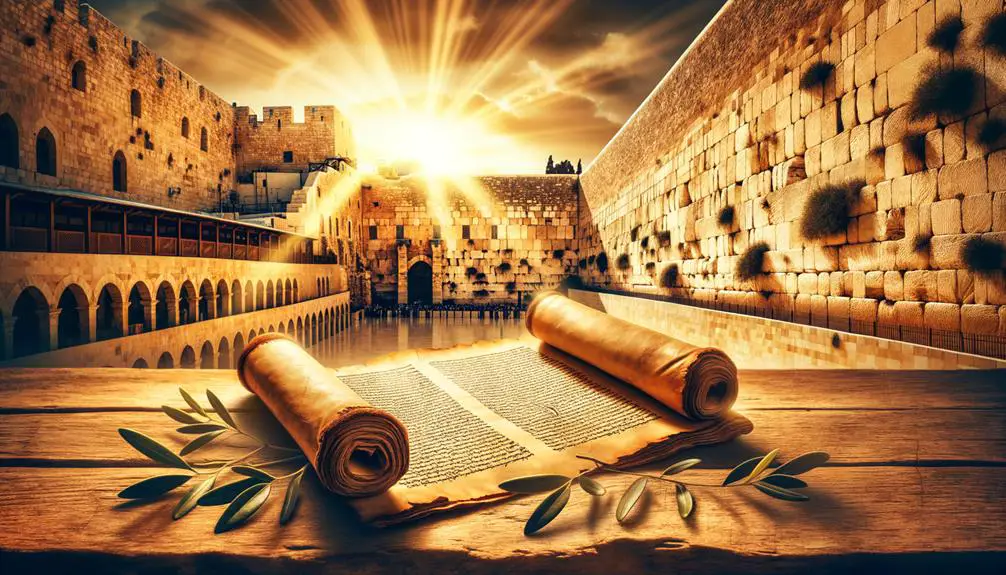
Zionism in the Bible
Zionism, as a seed sown in the fertile ground of the Bible, has grown into a complex and deeply rooted tree, branching out into both historical and contemporary discussions.
You'll find that the narrative of the Promised Land, beginning with the Genesis stories, isn't just ancient history; it's a living, breathing dialogue that continues to shape modern perspectives. The prophetic visions of return and themes of exile and hope for redemption are more than theological concepts—they're the underpinnings of a movement that has real-world implications.
By exploring these biblical roots, you'll uncover layers of meaning that might just change how you view the world.
Key Takeaways
- Zionism's roots are deeply intertwined with biblical promises of land to the Israelites.
- Prophecies in the Bible support the Jewish return and restoration of their homeland.
- Biblical narratives provide a framework for Jewish self-determination and national identity.
- The themes of exile, redemption, and restoration are central to understanding Zionism's biblical foundations.
The Genesis of Zionism
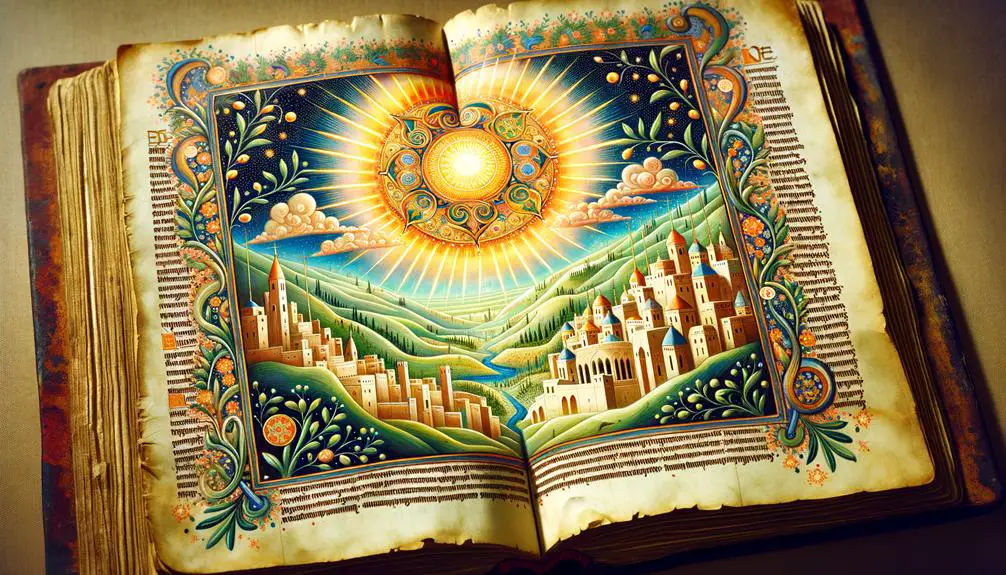
The term 'Zionism' finds its roots in the late 19th century, yet its ideological essence can be traced back to biblical narratives that emphasize a profound connection between the Jewish people and the land of Zion. This historical linkage serves as the foundational bedrock upon which modern interpretations and political implications of Zionism rest. As you delve deeper, you'll find that Zionism, in its contemporary form, isn't a monolithic ideology but rather a spectrum of beliefs and aspirations centered around the Jewish people's right to self-determination in their ancestral homeland.
The political implications of Zionism have evolved significantly over time. Initially, it served as a rallying cry for the establishment of a Jewish state, a goal realized with the founding of Israel in 1948. Since then, the focus has shifted to the state's development and the complex relationship between national identity and democratic values. Modern interpretations of Zionism also grapple with the challenges of ensuring security, peace, and coexistence in a region marked by longstanding conflicts.
Analyzing Zionism through a scholarly lens requires a nuanced understanding of its historical roots and how they inform current debates. The ideology's biblical underpinnings continue to influence its political manifestations, shaping policies and discourse both within Israel and in the broader international community. As Zionism moves forward, it remains a potent force in shaping the identity and destiny of the Jewish people, while its interpretations and implications continue to evolve in response to changing political, social, and religious landscapes.
Promised Land Narratives
Exploring the narratives of the Promised Land, you'll uncover how these biblical stories have profoundly shaped Zionism's ideological framework and its political aspirations. Central to these narratives is the divine promise of a land flowing with milk and honey, designated as an inheritance for the Israelites. This concept hasn't only spiritual implications but also tangible, political ramifications that have influenced Zionism's pursuit of establishing a national homeland.
From a scholarly standpoint, it's crucial to consider the Canaanite perspective, often overshadowed by the dominant narrative. The biblical text presents the Canaanites as the original inhabitants of the land, setting up a complex historical and ethical dialogue surrounding the Israelite conquest and settlement. This aspect invites a deeper analysis of the intersection between ancient narratives and modern political claims, challenging readers to reflect on the implications of historical continuity and change.
Furthermore, the Promised Land narratives are intricately linked with agricultural laws, which served as a practical foundation for the Israelite society in Canaan. These laws not only regulated land use and ownership but also embedded a sense of responsibility towards the land and community. They highlight the importance of sustainable practices and social justice, principles that resonate with certain contemporary Zionist interpretations focused on environmental stewardship and equitable development.
Analyzing the Promised Land narratives from these angles sheds light on the multifaceted relationship between ancient texts and the ideological underpinnings of Zionism. It reveals how biblical stories continue to influence debates on identity, land, and sovereignty, shaping the contours of political and social discourse in significant ways.
Prophetic Visions of Return
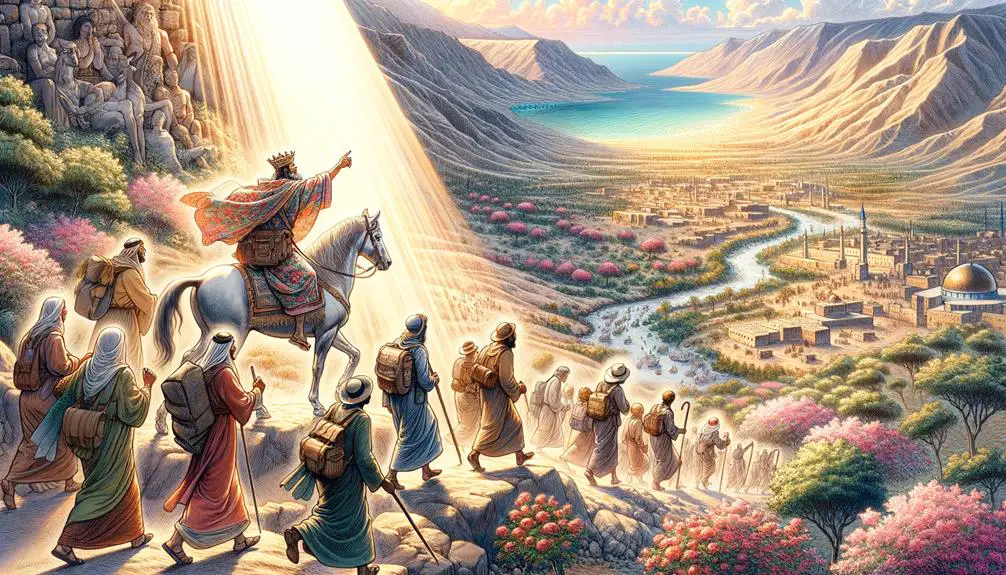
As you transition from the narratives of the Promised Land, it's crucial to examine the prophetic visions of return found within biblical texts. These visions underscore the fulfillment of biblical promises and the significance of land reclamation prophecies in the context of Zionism.
They offer a foundational understanding of how these ancient texts have been interpreted to support the ideological and territorial aspirations of the Zionist movement.
Biblical Promises Fulfilled
Numerous biblical prophecies have been interpreted as foreseeing the return of the Jewish people to their ancestral homeland, marking a cornerstone in the study of Zionism within a biblical context. These visions, deeply rooted in a divine covenant, present not only a physical return but also serve as a spiritual metaphor for renewal and restoration.
Scholars argue that the fulfillment of these prophecies is evident in the historical re-establishment of Israel, seeing it as a tangible manifestation of ancient promises. This perspective underscores the intertwining of faith, history, and the idea of a promised land, reinforcing the belief in a providential plan for the Jewish people.
The analysis of these fulfilled prophecies offers profound insights into the spiritual and national identity of Israel.
Land Reclamation Prophecies
Building on the foundation of biblical promises fulfilled, we now examine specific prophecies that envision the return and reclamation of land by the Jewish people. These visions are not merely spiritual allegories but have concrete implications for agricultural development and environmental stewardship. The prophetic narrative emphasizes a transformative process, where the once barren lands bloom through diligent care and innovation.
Prophecy Aspect |
Agricultural Development |
Environmental Stewardship |
|---|---|---|
Reclamation |
Cultivation of desolate lands |
Restoration of natural habitats |
Fertility |
Introduction of sustainable farming techniques |
Implementation of water conservation methods |
Prosperity |
Boost in local and national economies |
Enhancement of biodiversity |
This table highlights the intertwined nature of prophecy fulfillment with practical steps towards improving the land, showcasing how ancient visions have guided modern efforts in making the land flourish once again.
Jerusalem: A Central Theme
Jerusalem holds a paramount position in the discourse of Zionism, serving as both a historical epicenter and a contemporary symbol of Jewish identity and national aspiration. Its significance isn't merely territorial but deeply woven into the spiritual and cultural fabric of Judaism. The city's importance and spiritual symbolism are underscored by its frequent mention in the Hebrew Bible, where it's depicted as the chosen site for the Temple, a central locus of worship, and a place where the divine presence is uniquely manifest.
Analyzing the biblical narrative, you'll notice Jerusalem's central theme isn't accidental but deliberate, highlighting its role as the heart of Jewish sovereignty and religious life. The city embodies the convergence of history, prophecy, and theology, standing as a testament to the enduring bond between the Jewish people and their ancestral land. This connection isn't just historical; it's imbued with a deep spiritual significance that transcends generations.
Moreover, Jerusalem's significance is amplified by its role in the collective memory and identity of the Jewish people. It symbolizes the longing for return and restoration, a theme that resonates deeply within Zionist ideology. The city's centrality in Jewish thought and practice underscores its importance not only as a physical space but as a beacon of hope and spiritual aspiration.
In essence, Jerusalem's role in Zionism and the biblical narrative highlights the intricate tapestry of city significance and spiritual symbolism. It serves as a powerful emblem of Jewish continuity, resilience, and the unbreakable bond between a people and their sacred homeland.
Exile and Hope for Redemption
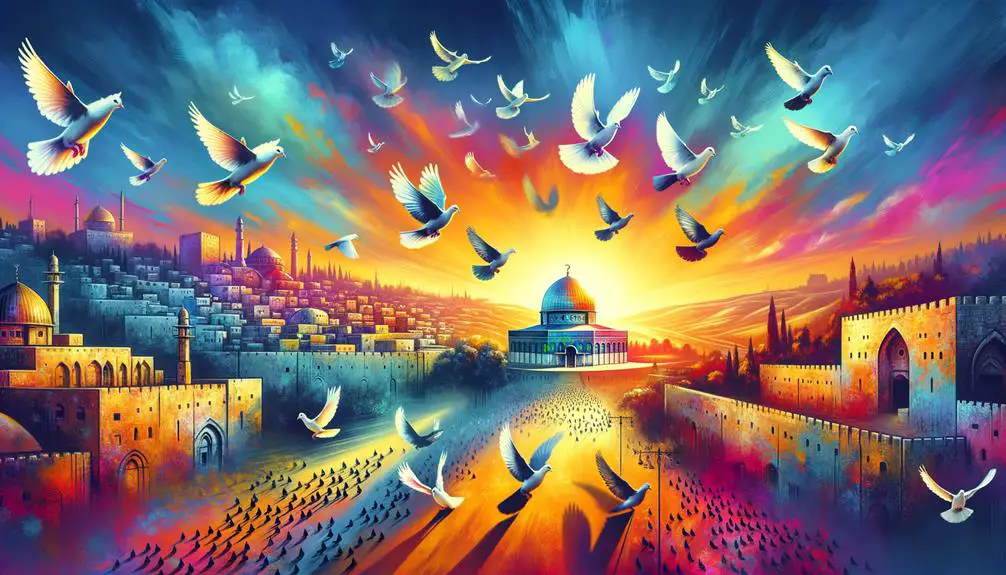
The concept of exile, intertwined with the hope for redemption, forms a core narrative thread throughout the biblical texts, shaping the historical and spiritual consciousness of the Jewish people. This theme not only recounts physical displacement but also embodies spiritual metaphors, reflecting a deeper, internal journey of estrangement and reconciliation with God. By examining this theme, you'll uncover how the biblical portrayal of exile and redemption offers profound insights into the dynamics of despair, hope, and covenant renewal.
To paint a picture of how this theme unfolds, consider the following:
- Exile as Divine Punishment and Reflection: The narratives often present exile as a consequence of the Israelites' failure to uphold their part of the covenant with God. This period of estrangement serves as a time for reflection and acknowledgment of their shortcomings.
- Prophetic Warnings and Promises: Prophets like Isaiah and Jeremiah play key roles, warning of impending exile due to disobedience but also offering hope for eventual redemption and return, contingent upon covenant renewal.
- Spiritual Metaphors of Exile: Beyond the physical displacement, exile represents a spiritual distance from God. The biblical text uses this metaphor to explore themes of sin, repentance, and the longing for spiritual reconciliation.
- Hope for Redemption and Renewal: Despite the grim circumstances of exile, the biblical narrative consistently emphasizes hope for redemption. This hope isn't just for physical return but for a renewed relationship with God, highlighting the enduring nature of the covenant.
This exploration reveals that the biblical treatment of exile and hope for redemption isn't merely historical recounting but a rich tapestry of spiritual metaphors and lessons on covenant renewal.
Rebuilding and Restoration Themes
You'll find that the themes of rebuilding and restoration are central to understanding Zionism in the biblical context.
The prophetic promises of a restored Jerusalem, teeming with life and prosperity, underscore the envisioned glory and renewal of Zion.
These narratives not only reflect a historical longing but also anchor the modern Zionist movement in a deeply rooted spiritual tradition.
Prophetic Promises Fulfilled
Biblical narratives often highlight the fulfillment of prophetic promises, particularly in the context of Israel's rebuilding and restoration. This phase of history is marked by Divine intervention and Covenant continuity, underscoring the unbreakable bond between the divine and Israel. To understand this, consider the following:
- Return from Exile: Prophets like Isaiah and Jeremiah foretold the return of the Jewish people to their homeland, a promise realized under Persian rule.
- Rebuilding the Temple: Predicted in scripture, this act symbolized the restoration of worship and covenantal life.
- Restoration of the Law: The re-establishment of Torah observance was crucial for renewing the covenant.
- Revival of the Community: Prophecies envisioned a flourishing community, underpinned by divine blessings and guidance, signifying a new era of prosperity and spiritual renewal.
Jerusalem's Renewed Glory
Building upon the foundation of prophetic promises fulfilled, we now turn our focus to the theme of Jerusalem's renewed glory, where the city's rebuilding and restoration underscore its pivotal role in the spiritual and national identity of the Jewish people. Architectural innovations have not only transformed the skyline but also reinstated Jerusalem as a beacon of progress and tradition. Meanwhile, cultural festivals breathe life into ancient streets, weaving the past and present into a vibrant tapestry.
Aspect |
Influence on Jerusalem |
Impact |
|---|---|---|
Architectural Innovations |
Skyline Transformation |
Progress |
Cultural Festivals |
Tradition Revival |
Unity |
Restoration Efforts |
Spiritual Reclamation |
Identity |
These facets collectively illuminate Jerusalem's path toward a future that honors its rich historical essence while embracing modernity.
Zionism's Biblical Roots Today
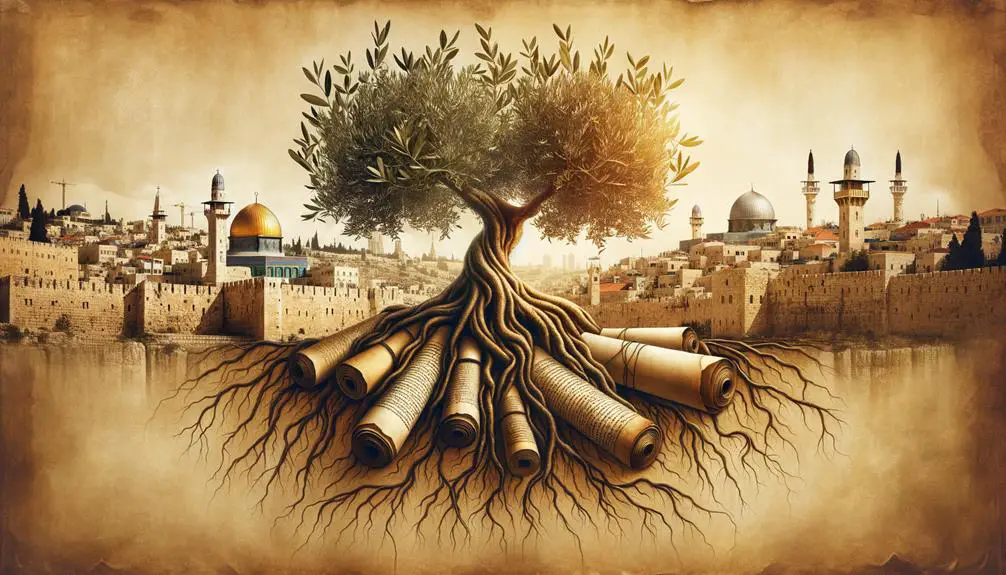
In examining Zionism's biblical roots today, it's essential to recognize how ancient texts have influenced modern nationalist movements. The interplay between historical narratives and contemporary ideologies demonstrates a profound connection, drawing from the Bible's depiction of covenant significance and Diaspora implications. These elements not only shaped the early Zionist ethos but continue to resonate within its modern iterations.
To understand this enduring influence, consider the following aspects:
- Covenant with the Land: The biblical narrative establishes a divine covenant between the Jewish people and the land of Israel. This covenant isn't merely historical or spiritual but serves as a foundational element for Zionist claims and aspirations, reinforcing the notion of an inalienable right to this territory.
- Diaspora and Return: The experience of Diaspora, characterized by dispersion and longing for return, is a central theme in Jewish history. Zionism reinterprets this longing in light of biblical prophecies, advocating for a physical and spiritual return to Zion as a fulfillment of those ancient promises.
- National Identity Formation: The biblical stories contribute to the shaping of a collective Jewish identity, emphasizing resilience, faith, and a deep connection to the land. This identity is pivotal for the Zionist movement, serving as both motivation and justification for the establishment of a Jewish state.
- Ethical and Moral Foundations: The biblical texts offer ethical guidelines that have informed Zionist leadership and policy decisions. The emphasis on justice, compassion, and peace has been integral to the movement's vision for a society that mirrors the prophetic ideals.
Zionism's biblical roots thus provide a rich tapestry of themes and values that continue to inspire and challenge its contemporary expressions.
Frequently Asked Questions
How Do Modern Archaeological Findings Support or Contradict the Biblical Narratives Related to Zionism?
You're looking at how modern archaeological findings align or clash with biblical narratives. Ancient inscriptions and settlement patterns are key here.
These findings can both support and challenge the historical accounts found in sacred texts. For instance, ancient inscriptions may verify the existence of people or places mentioned, while settlement patterns can offer insights into the way societies were organized, shedding light on the events and lifestyles depicted in these narratives.
What Has Been the Influence of Zionism on Contemporary Interfaith Relations, Especially Between Jewish, Christian, and Muslim Communities?
Zionism's impact on contemporary interfaith relations, particularly among Jewish, Christian, and Muslim communities, can't be understated. It's fostered both challenges and opportunities for dialogue.
You've seen how it's influenced interfaith dialogues, sometimes straining relationships, yet also facilitating cultural exchanges that enrich understanding. This complex dynamic underscores the need for ongoing, respectful conversations that bridge differences and promote mutual respect among these diverse religious groups.
How Have Different Jewish Denominations (Orthodox, Conservative, Reform, Etc.) Historically Interpreted Zionism in Relation to Their Theological Beliefs?
You're diving into how Jewish groups have historically viewed Zionism, considering their unique theological backgrounds.
Take Orthodox Judaism, for instance, which traditionally aligns closely with Zionist ideals, viewing the establishment of Israel as a fulfillment of biblical prophecy.
This contrasts with Reform Judaism, which initially approached Zionism cautiously.
These denominational differences highlight the complexity within historical context, showing that there's no one-size-fits-all interpretation of Zionism among Jewish communities.
In What Ways Have Zionism and Its Biblical Underpinnings Impacted Israeli National Identity and Law?
Zionism's influence on Israeli national identity and law intertwines deeply with political implications and cultural identity. You'll find that its biblical roots have shaped legislation and societal norms, reflecting a unique blend of ancient heritage and modern governance.
This interplay has forged a strong sense of national unity and purpose, affecting everything from immigration policies to education. Analyzing this dynamic offers insights into how historical narratives can mold a country's contemporary identity and legal framework.
How Do Non-Religious or Secular Viewpoints Within the Jewish Community Engage With the Concept of Zionism, Especially in Relation to Its Biblical Origins?
As the saying goes, 'Not all that glitters is gold,' not every Jewish person views Zionism through a religious lens.
Within the community, many adopt a secular stance, engaging with Zionism as a movement grounded in cultural and historical ties rather than biblical ones.
This secular activism emphasizes Cultural Zionism, focusing on the preservation and promotion of Jewish culture, identity, and rights, independently of religious motivations or interpretations.
Conclusion
In essence, Zionism's roots in the Bible weave through narratives of promise, exile, and hope for redemption. It's clear that Jerusalem holds a central place in these ancient texts, embodying the longing for return and restoration.
Analyzing these themes, one can't help but remember the adage, 'where there's a will, there's a way.' This sentiment echoes through the prophetic visions, highlighting a resilient hope for rebuilding.
Zionism, as presented in the Bible, showcases a profound and enduring connection to the land.



Sign up